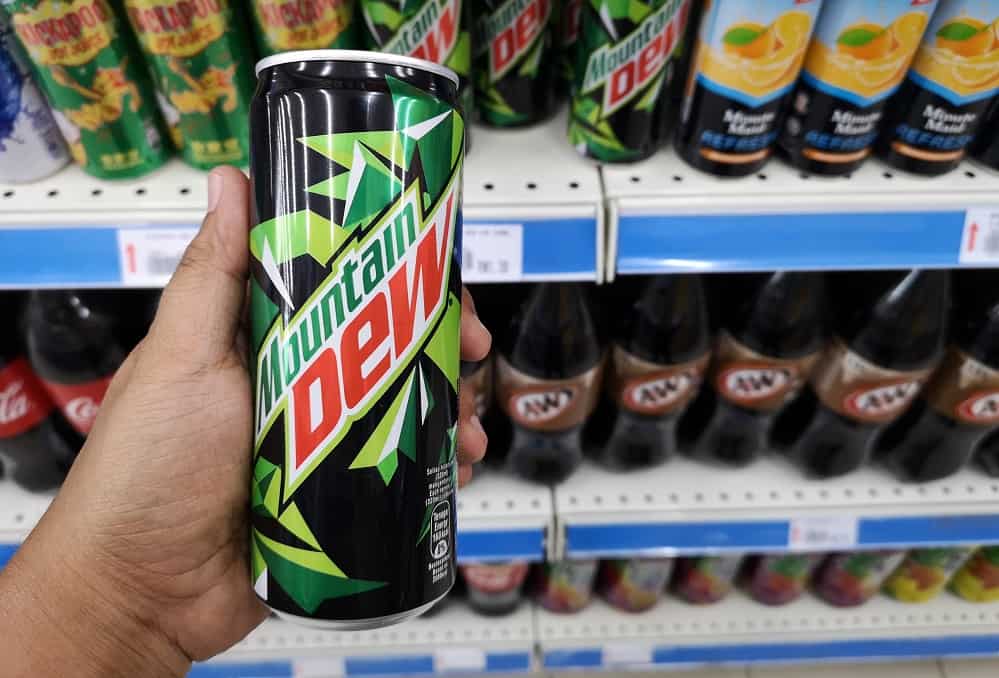Mountain Dew is a popular citrus soft drink by PepsiCo. In the first few decades of its debut, Mountain Dew was offered in only one flavor (the citrus flavor). While this drink has direct competitors from the Coca-Cola Company and the Dr Pepper Snapple Group (i.e., Mello Yello, Surge, and Sun Drop). With its popularity, many people wonder whether Mountain Dew is vegan.
Based on the ingredients list, Mountain Dew is considered to be vegan as it does not contain any obvious animal products. However, there are a few ingredients that some vegans may consider to be gray areas like artificial coloring and natural flavors.
Table of Contents
Is Mountain Dew Vegan?

Depending on the vegan you ask, Mountain Dew is considered vegan. For dietary vegans, Mountain Dew is okay to be consumed as none of the ingredients consist of animal products. However, ethical vegans may think otherwise - especially because of food coloring.
On PepsiCo’s official website, they declare all their products to be vegan except two: Diet Pepsi and Diet Pepsi Caffeine Free.
"Our products are suitable for vegetarian and vegan diets, apart from Diet Pepsi and Diet Pepsi Caffeine Free which aren’t suitable for vegans."
PepsiCo.
While this can be enough evidence for some individuals, the problem is that PepsiCo does not disclose how they interpret veganism. Some companies declare their products vegan because their products are animal-free, but not necessarily cruelty-free.
Mountain Dew Ingredients List
A standard Mountain Dew contains the following ingredients(1): Carbonated water, high fructose corn syrup, concentrated orange juice, citric acid, natural flavor, sodium benzoate, caffeine, sodium citrate, gum arabic, erythorbic acid, calcium disodium edta, and yellow 5.
At first glance, one would think Mountain Dew is vegan because none of the ingredients consist of obvious animal products or by-products. However, there are some ingredients that some vegans take issue with: yellow 5 and natural flavors. There are also other flavors that contain additional ingredients that can be problematic.
Yellow 5
Yellow 5 is an artificial food coloring agent. It is used in a variety of commercial products such as cereals, beverages, candy, cosmetics, and baked goods.
Being a synthetic food coloring agent, yellow 5 is not made with any animal products or by-products. However, yellow 5 and most other artificial food coloring products undergo animal testing. Due to this fact, yellow 5 would not be considered vegan according to ethical vegans.
Yellow 5 is primarily tested on rats and mice(2).
Other flavors of Mountain Dew also follow this trend. They do not necessarily have animal products in their list of ingredients, however they contain food coloring agents that have been tested on animals.
For example, other flavors have different artificial food coloring: Yellow 5 in Diet Mountain Dew, Blue 1 and Red 40 in Voltage Mountain Dew, Yellow 5 in Mountain Dew Red, Yellow 5 and Blue 1 in Distortion Mountain Dew, Blue 1 and Red 40 in Dark Berry Mountain Dew, Yellow 6 and Red 40 in Cold Fusion Freeze Mountain Dew, and so on.
Red 40 was tested on Rats, Mice(3), and Caterpillars(4).
Blue 1 was tested on Rats and Mice(5). Dogs(6) have also been used.
Yellow 6 was been tested on rabbits(7), mice, and rats(8).
Natural Flavors
Natural flavors are also considered to be a gray area because of the FDA's vague definition:
“The essential oil, oleoresin, essence or extractive, protein hydrolysate, distillate, or any product of roasting, heating or enzymolysis, which contains the flavoring constituents derived from a spice, fruit or fruit juice, vegetable or vegetable juice, edible yeast, herb, bark, bud, root, leaf or similar plant material, meat, seafood, poultry, eggs, dairy products, or fermentation products thereof, whose significant function in food is flavoring rather than nutritional.”
FDA
This means that “natural flavors” may or may not be vegan. Product labels rarely make this distinction.
Sugar
Another ingredient found in some flavors is sugar (Mountain Dew throwback). While sugar has been replaced with high fructose syrup in most parts of the world, some flavors still use sugar as the primary sweetener.
Sugar is a problematic ingredient for the vegan community because a large portion of sugar in the United Sates is filtered using bone char (charred animal bones, primarily cattle).
However, not all sugar is processed this way, again it is often not stated whether or not this is the case. Vegan ways to process sugar involve granulated activated carbon and/or ion-exchange systems.
Bromated Vegetable Oil?
A lot of other Vegan resources will bring up Bromated Vegetable Oil (BVO) and Glycerol Ester of Wood Rosin. However as of 2020, PepsiCo. no longer uses BVO or Glycerol Ester of Wood Rosin (ester gum) in their ingredients list.
It's important to note that PepsiCo. does have an "Ingredient Glossary." However, I suspect it's exhaustive for the sake of transparency. It doesn't necessarily mean they include those ingredients in their products.
"Brominated Vegetable Oil (BVO) is used in some beverages to help keep flavoring oils well-blended. Since oils do not mix well with water, BVO helps dissolve and keep the flavor oils evenly distributed throughout the beverages. BVO is usually derived from corn or soybean oil."
PepsiCo.
Brominated vegetable oil was a common ingredient found in Coca-Cola and PepsiCo. products up until 2014(9) when they banned it. This was due large in part to a petition(10) by Sarah Kavanagh.
In citrus-flavored beverages BVO acts as a binding agent; This means that it keeps the liquids in the beverages mixed homogenously, preventing the liquid ingredients in the drinks from dissociating into separate layers.
This ingredient was listed as ‘Generally Regarded as Safe’ (GRAS) up until 1970. However, the U.S. Code of Federal Regulations imposes restrictions on it's use as a food additive limiting concentrations to 15 ppm(11). This is because brominated vegetable oil competes with iodine for receptor sites in the body.
When the body lacks iodine, certain problems can occur including thyroid issues, autoimmune disease, and even cancer. The ingredient has also been linked to other health concerns such as organ system damage, birth defects, schizophrenia, and hearing loss.
Glycerol Ester of Wood Rosin/Ester Gum?
Glycerol Ester and Wood Resin, glycerol ester of rosin, or ester gum is another ingredient Vegans are suspect of.
Glycerol ester of resin is an oil-soluble food additive that is used to help keep oils in suspension in water. Vegans take issue with this ingredient due to how it's made.
From PepsiCo.'s description:
"Ester Gum is a purified rosin from pine trees that is combined with glycerin to form glycerol esters, which make it more soluble."
PepsiCo.
Glycerol ester of resin is made of two things: wood resin and glycerin.
Wood resin is typically obtained from longleaf pines (Pinus palustris) and slash pines (Pinus elliottii), which is considered vegan by both dietary and ethical vegans.
However, glycerin is problematic because it may or may not be vegan. Glycerin can be obtained from two sources: vegetable oil and animal fat.
Understandably, if the glycerin was obtained from vegetable oil, then the glycerol ester of rosin would be vegan. However, the distinction is not usually made on the packaging.
References:
2. http://www.ijppsjournal.com/
5. https://www.efsa.europa.eu/
6. https://www.sciencedirect.com/




